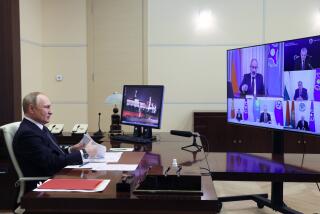Visit by Shevardnadze Thaws the Ice in Japan; Akihito Gets Invitation : Diplomacy: The Soviet official invites the emperor to visit, says Gorbachev will urge a peaceful Iraq solution.
- Share via
TOKYO — Soviet President Mikhail S. Gorbachev will urge President Bush to refrain from taking unilateral military action and seek a peaceful solution to the Middle East crisis when the two leaders meet Sunday in Helsinki, Soviet Foreign Minister Eduard A. Shevardnadze said here Friday.
Concluding a four-day visit that has melted at least some of the ice that has chilled Soviet-Japanese relations for decades, Shevardnadze also told a press conference that he had invited Emperor Akihito to visit the Soviet Union.
Misoji Sakamoto, the chief Cabinet secretary, said the invitation was welcomed as a symbol of Soviet goodwill toward Japan. He said the “idea had never come to mind” here.
No date was suggested for the visit. Akihito was reported to have thanked Shevardnadze for the invitation and told him the Japanese government will have to study it.
A day earlier, Shevardnadze informed Prime Minister Toshiki Kaifu that Gorbachev will come to Japan in April. He would be the first Soviet leader ever to visit this country.
Shevardnadze did not suggest that Gorbachev would agree to Japan’s demand for the return of four islands off northern Japan that were seized by the Soviets after World War II. But he told a reporter that the Soviet Union is willing to negotiate “changes in national boundaries . . . on a rational basis.” He cited as precedents Soviet negotiations over boundaries with West Germany, China, Sweden and Norway.
He emphasized throughout his visit that a solution to the territorial dispute would take time and would be considered only in the context of a much-improved overall Tokyo-Moscow relationship.
Although Japan and the Soviet Union resumed diplomatic relations in 1956--they were broken at the time of World War II--Japan has refused to sign a peace treaty without a promise that the islands will be returned.
Shevardnadze refused to speculate on the outcome of Sunday’s Bush-Gorbachev meeting. But he said the Soviet Union sees “no need for the United States to take unilateral military action” in the Persian Gulf region. He said it “should go through the United Nations Security Council.”
Moscow, he said, is prepared to cooperate with the United States at the United Nations in approving “even coercive measures” against Iraq.
He indicated that Gorbachev will urge Bush to support a Soviet proposal to convene an international Middle East conference to discuss the Iraqi invasion of Kuwait, the Israeli-Arab confrontation and the civil war in Lebanon.
Turning to another conflict, Shevardnadze announced that his government will recognize Prince Norodom Sihanouk as a legitimate negotiating partner and begin contacts with his tripartite Cambodian resistance coalition. He said this was in response to the announcement that Washington will open a dialogue with the Hun Sen government of Cambodia, which the Soviets have supported.
Shevardnadze also said that he will meet this month with South Korea’s foreign minister, Choi Ho Joong, at U.N. headquarters in New York and that they will discuss the establishment of diplomatic relations between Moscow and Seoul.
“Handling relations with South Korea is a sovereign right of the Soviet Union,” he said, adding that Communist North Korea, a Soviet military ally, “is not in a position to apply any restraints or restrictions.”
He complained about what he called a Japanese penchant “to grow apprehensive every time we suggest discussing security in Asia and the Pacific.”
He said his government has “only one interest--to see to it that military activity in the Pacific, the Indian Ocean and neighboring states is reduced to tranquility.” In response to a question, he said the Soviet Union is “in the process of forming a new military doctrine of minimum defense sufficiency.”
He also criticized Japan for refusing to offer financial help to economic reforms and promote private Japanese investment in the Soviet Union.
In nearly nine hours of talks with Shevardnadze, Foreign Minister Taro Nakayama made it clear that Japan is now willing to discuss a broad range of cooperation, short of financial aid, while continuing negotiations on the territorial dispute.
More to Read
Sign up for Essential California
The most important California stories and recommendations in your inbox every morning.
You may occasionally receive promotional content from the Los Angeles Times.













